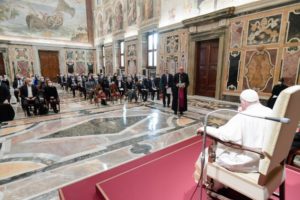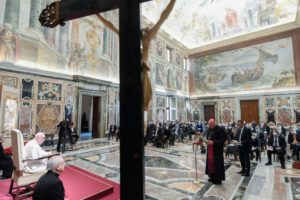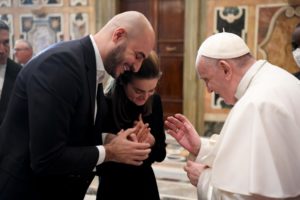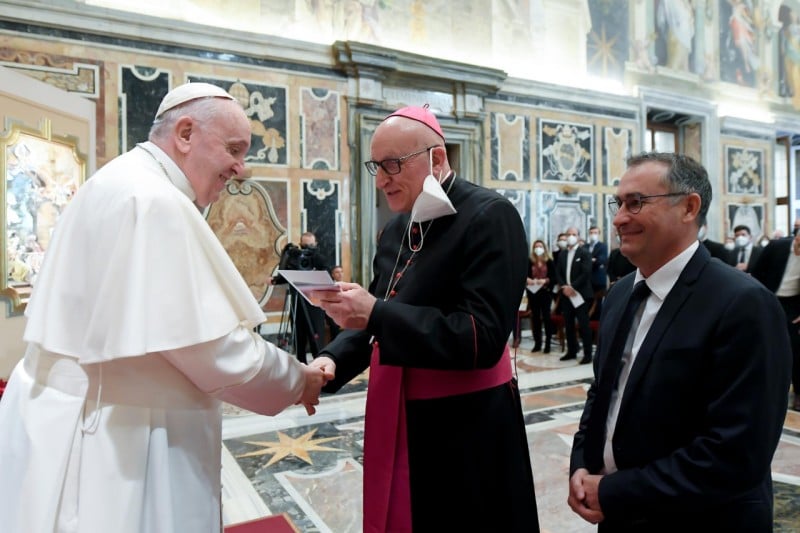Pope Francis shared some Gospel teachings with French businessmen to help them “fulfill their role as leaders according to God’s Heart.”
On Friday, January 7, 2022, the Pontiff received in audience a group of businessmen from France, who were on pilgrimage to Rome.
A Heart at the Service of All
In his address, the Pope highlighted how “lovely and courageous” it is that, despite the marginalization of the most vulnerable people,” there are businessmen and business leaders who have at heart the “service of all and not just private interests or those of restricted circles.”
The Holy Father wished to share teachings of the Gospel “to help you fulfill your role as leaders according to God’s Heart.” To do so, he presented “two pairs of concepts, which seem to be always in tension, but which a Christian, helped by grace, can unify in his life: ideal and reality; authority and service.”
Ideal and Reality

In his address the Holy Father also referred to the quest for the common good; “it’s a question that concerns you, an ideal, in the contexts of your professional responsibilities.” Hence, the common good is a determinant element in your discernment and in your choices as Directors, but it must include the obligations imposed by the existing economic and financial systems, which often ridicule the evangelical principles of social justice and charity.”
Authority and Service

To Have the ‘Smell of Sheep’

The Bishop of Rome also reminded them that “the exercise of authority as service requires sharing it.” Here, too, “Jesus is our Teacher, when He sends His disciples on mission, giving them His own authority (cf. Matthew 8:18-20).”
Finally, the Successor of Peter pointed out how exacting the Gospel can be and “how difficult it is to apply it to a competitive professional world.” Nevertheless, the Pontiff invited them “keep your gaze fixed on Jesus Christ, with your life of prayer and the offering of your daily work,” he concluded in his address.
Here is the Holy Father’s full address offered by the Holy See Press Office.
* * *
The Holy Father’s Address
Dear Friends,
I’m happy to receive you on the occasion of your pilgrimage to Rome on the subject of the common good. I thank Archbishop Dominique Rey for his kind words. It seems to me very lovely and courageous that in today’s world, often marked by individualism, indifference, and also the marginalization of very vulnerable people, some businessmen and business leaders have at heart service to all and not only of private interests or those of restricted circles. I have no doubt that this is a challenge for you. So I would like to share with you some Gospel teachings to help you to fulfill your role as leaders according to God’s Heart. I will take two pairs of concepts that seem to be always in tension, but which a Christian, helped by grace, can unify in his life: ideal and reality; authority and service.
The ideal and the reality. A few days ago I recalled that “collision,” that shock that every Christian experiences often between the ideal he dreams about and the reality he finds. I did so referring to the Virgin Mary before the Crib of Bethlehem, She who was obliged to give birth to the Son of God in the poverty of a stable (cf. Homily, January 1, 2022): “We hope that all will go well and then an unexpected problem arrives, like a bolt of lightning. And a painful shock ensues between the expectations and the reality” (ibid.).
The quest for the common good is a question that concerns you, an ideal, in the context of your professional responsibilities. Hence, the common good is a determinant element in your discernment and in your choices as Directors, but it must include the obligations imposed by the existing economic and financial systems, which often ridicule the evangelical principles of social justice and charity. And I imagine that sometimes, your task weighs on you; that your conscience enters into conflict when the idea of justice and the common good, which you would like to attain has not been realized and the harsh reality appears to you as a lack, a setback, a regret, a shock.
It’s important that you be able to overcome this and live it with faith so that you can persevere and not be disheartened. In face of the “scandal of the manger,” Mary was not discouraged, she did not rebel, but she reacted by guarding it and meditating on it in her heart, showing an adult faith, which is strengthened with trials. To guard is to accept, despite the darkness and with humility, the things that are difficult to accept, that we didn’t want, that we couldn’t avoid; not try to disguise or put “makeup” on life, to escape from our responsibilities. And to meditate, in prayer, is to unify the good and bad things that make up life, to understand better their intertwining and meaning in God’s perspective (cf. ibid.).
The second pair: authority and service. When the Apostles were discussing which one was the greatest among them, Jesus intervened: “If anyone would be first, he must be the last of all and servant of all” (Mark 9:35). The mission of the Christian leader is, in many aspects, like that of a Pastor, of which Jesus is model, and who is able to go in front of the flock to show the way; is able to stay at the center, to see what is happening there, and is able to stay behind, to ensure that no one loses contact. I have often urged priests and Bishops to have “the smell of sheep,” to immerse themselves in the reality of the people that have been entrusted to them, to know them, and to be close to them. I think this advice also applies to you. Hence, I encourage you to be close with those that work with you at all levels: to be interested in their lives, to be aware of their difficulties, sufferings, anxieties but also of their joys, plans, and hopes.
The exercise of authority as service requires sharing it. Here, also, Jesus is our Teacher, when He sends His disciples on mission, giving them His authority (cf. Matthew 28:18-20). You are invited to put subsidiarity into practice by which the “autonomy and capacity of the initiative is valued in all, especially of the littlest ones.” All the parts of the body are necessary and [. . . ] those parts that might seem weaker and less important are in reality the most necessary” (General Audience, September 23, 2020). Hence a Christian executive is called to consider carefully the place that is assigned to all the people of his business, including those whose functions might seem less important, because all are important in God’s eyes. Although the exercise of authority does not call for taking courageous decisions, sometimes personally, subsidiarity enables each one to give the best of himself, to feel himself a participant, shoulder his part of the responsibility, and thus contribute to the good of the whole.
I’m conscious of how exacting the Gospel can be, and how difficult it is to apply it in a competitive professional world. Nevertheless, I invite you to keep your gaze fixed on Jesus Christ, with your life of prayer and the offering of your daily work. The Lord experienced it on the cross, who loved us to the end, who fulfilled His mission to give His life. You also have your crosses to bear, but have confidence. Christ has promised to accompany us “until the end of the world (Matthew 28:20). Don’t hesitate to invoke the Holy Spirit that He may guide your decisions. The Church needs your witness.
I thank you and I bless you. And don’t forget to pray for me. Thank you.
© Libreria Editrice Vatican
Translation by Virginia M. Forrester










